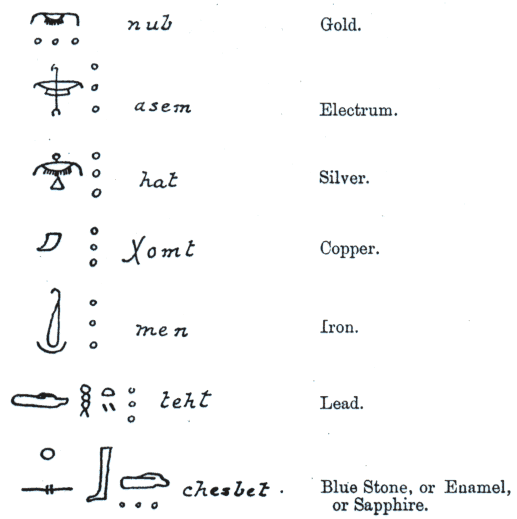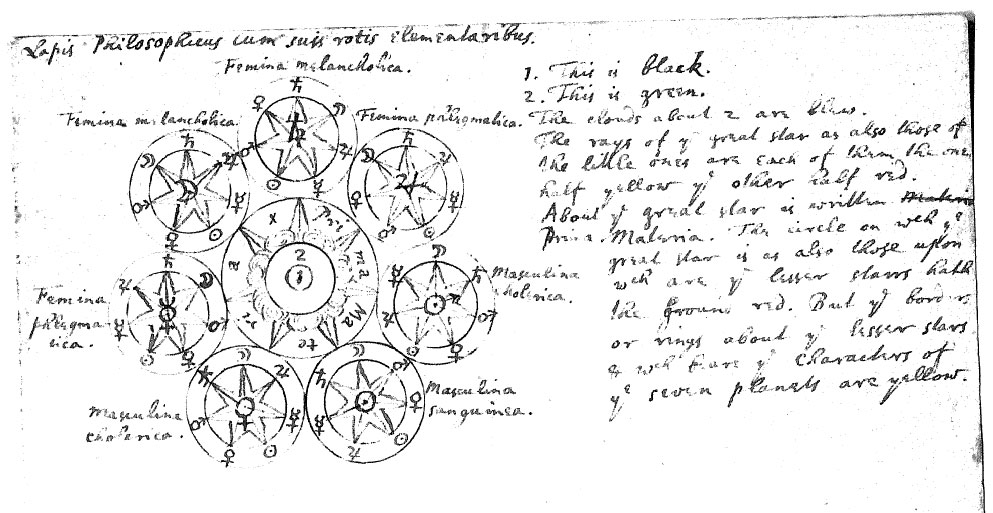Alchemy, like chemistry, had 'chem' at its core. Chem derives from Khem ('black land'), which was the name for what we call Egypt, due to the dark alluvial soil provided by the flooding Nile each year. Egypt was well known to Greeks and Romans but it wasn't until the 8th century that Arab Muslims, having conquered it in the previous century, re-introduced the science from their new state to Europe, a state which they called Al-Khem. This science believed that metals were composed of sulfur and mercury. Gold was the perfect metal and a Philosopher's Stone could transmute baser metals into it.
Through the Dark Ages, chemistry and alchemy were one and the same, but it was only partly a real science and less so as it became more metaphysical. As the opportunities for science came more into focus, the group that wanted to deal with natural laws and discover compounds and their reactions split off, leaving the spiritual side searching for immortality and transmutation. As time went on, alchemists became the subject of ridicule. Now you mostly find 'alchemy' in places that are also selling Tarot cards and crystals and what not.

Egyptian symbols for metals, from Lepsius, Metals in Egyptian Inscriptions, 1860. Credit and link: alchemywebsite.com
No harm in that, lots of legitimate people tried to study homeopathy once too, but if you try to cure yourself with it today, you are going to get ridiculed.
But alchemy gets a bad rap in the history of science too, which isn't really warranted, according to Lawrence Principe of Johns Hopkins.
I never ridiculed alchemy, though he notes that a lot of people in the past did and I see no reason to dispute his claim, other than to caution that taking a lot of jeering from a whole century and condensing it into one paper makes it look worse than it was - The Inquisition gets blown out of proportion the same way, though historians know better. Newton tried alchemy, after all, because he wanted to get to the bottom of it and maybe show chemists he was smarter than they were, just like he showed everyone else he was smarter than they were (I mean you, Hooke.)

Isaac Newton's manuscript 416 'Lapis philosphicus'. He wrote in code anyway so good luck figuring out what "It is therefore no wonder that - in their advice lay before us the rule of nature in obtaining the great secret both for medicine and transmutation. And if I may have the liberty of expression give me leave to assert as my opinion that it is effectual in all the three kingdoms and from every species may be produced when the modus is rightly understood: only mineralls [sic] produce minerals and sic de calmis" means. Credit: Royal Society. Link: world-mysteries.com
I never ridiculed alchemy because to me it was just like belief in skull drilling or leeching or organic food - it is often the case that people make intellectual choices with the information they have available and if they end up being wrong, that's science. It's when they ignore the science and persist in a belief that things end up going to a weird place, and that is what eventually happened to alchemy.
Today, transmutation is entirely possible, so they were not wrong that it was achievable; you give me enough energy and I can absolutely turn lead into gold. That does not legitimize alchemy any more than if I say 'faster than light travel will happen' and some day it does happen makes me a brilliant scientist.
The break between alchemy and chemistry had been happening before Newton, that is why he took a shot at it, but until the 18th century they were interchangeable to the public. And that is what Principe highlights as the reason alchemy got so much rancor; in order for chemists to be taken more seriously, they had to cast out the charlatans. It happens. You know which group was also ridiculed, even until the mid-1800s? Medical doctors. Many people thought Harvard was out of its mind creating a medical school in 1782 (1), but they took it seriously and within a few generations medicine had put quacks on the fringes and adopted evidence-based practices. Before then, legitimate doctors were Ph.D.s and Medical Doctors were that other thing that didn't count. Today, though, if you say doctor people assume you are an M.D.
When I was young, "The Illuminatus" trilogy, a jumbled, incoherent, fascinating, rambling attempt to make Baby Boomers and their fear of secret conspiracies feel important, was all the rage. And alchemy was important to secret societies, because it was all theirs, secret societies were the only ones who took it seriously by the 19th century. It was basically along the same lines as UFO cranks and Bigfoot searchers.
By the later part of the 20th century, conspiracies and secret societies aside, alchemy was a quaint, patronized field from a primitive time - pseudoscience.
In the humanities, it's tough to find things to write about; no one wants to read your criticism of a criticism of Proust. In history, the way to be interesting is to argue that history is wrong somewhere, so it was only a matter of time before alchemy, soundly ridiculed when I was young, would be embraced anew. And it has happened, says Principe, "Historians of science are now paying unprecedented attention to alchemy, and other academic fields are likewise acknowledging its wide influence and cultural relevance."
Yes, maybe those close-minded scientists finally came around to understanding it.
Or not. Alchemy as a philosophy never really left. We see it in all aspects of culture. Look at how often a government program will claim it spent X taxpayer dollars and it transmuted itself into 1.3X dollars. If you are like me, you probably think 'why not give 10BX to that program then? In a year we'd fix the deficit' but of course, it doesn't work that way. Like creating perpetual motion, you have to ignore some inputs to suspend your disbelief properly.
Principe, looking at the history of alchemy in hindsight, doesn't seem to realize that alchemy was ridiculed so much because people of the time were a lot closer to it than he is, and they knew it a lot better than he does today. He thinks the ridicule caused alchemy to lose favor, as if it were part of some Illuminatus conspiracy all its own, when instead it lost favor because the few serious people that did it got nowhere and everyone else was just goofy and making all of chemistry look bad just when chemistry showed promise to be meaningful. That reasoning would be like declaring hundreds of years from now that homeopathy fell out of favor because it was ridiculed, rather than falling out of favor because it was ridiculous. Yet homeopaths claim instances where it worked and Principe falls into the trap of saying alchemy was more legitimate than its perception because some substances were invented by alchemists. It's not the same thing as being science. There's nothing wrong with turning out to be pseudoscience - like Newton, you can try to legitimize alchemy but when the evidence isn't there, it becomes zealotry instead.
And there's nothing wrong with pseudoscience having a place in the history of science, but seeking to revise history so that alchemy was not pseudoscience at all, because early proponents did what they could with the chemistry they had, knocks out every definition of science. There is no junk or pseudoscience that can't have a similar rehabilitation the same way.
I don't think less of Newton because he studied alchemy, nor does it legitimize alchemy that he studied it. There's no intellectual or philosophical schism to it today and the works of scientists who studied alchemy were not later ignored as part of a conspiracy against it, as Principe implies, they were ignored because they yielded nothing. If I have limited time I want to read about Principia, not a failed effort later in Newton's career. The fact that John Maynard Keynes believed in alchemy does not validate it, it instead shows us what was wrong with Keynes-ian economic beliefs. He believed in eugenics too, that didn't make it valid.
Chemists were absolutely correct to cast off alchemists the same way medical doctors, those new graduates of medical schools, were correct to cast off magic potions. Are there natural medications that do work? Sure, but the exception does not invalidate the rule that magic potions are a bad way to stay healthy.
I don't necessarily agree with the conclusion, much less all of the precepts, but if you want a fascinating overview of alchemy through the last few hundred years, Principe offers a great way to spend 3,000 words of your life.
Citation: Lawrence M. Principe, 'Alchemy Restored', Isis Vol. 102, No. 2 June 2011, pp. 305-312
DOI: 10.1086/660139
H/T for the link to the paper: Matthew Hartings.
NOTES:
(1) Outside the scope of this paper, but I would argue that Harvard was more important to the legitimacy of medicine than Penn, which came before in the US, or the University of Edinburgh, much less the Arabic schools that had offered degrees earlier. None of those boosted the credibility and reputation of medicine the way Harvard did.





Comments